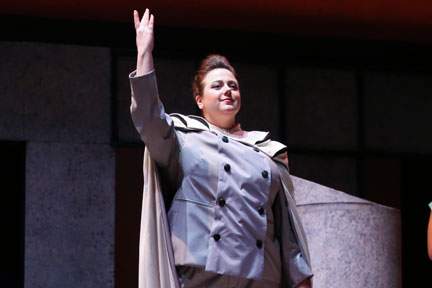
IU's Department of Theatre, Drama and contemporary Dance presents Julius Caesar in a thought provoking production set in what director Jenny McKnight calls "a time not far from now."
Shakespeare's Julius Caesar is based on the account of the lives of the aspiring Caesar, the too loyal Brutus and eloquent Mark Antony in Plutarch's Lives. Caesar is returning in triumph over Pompey from Spain. Conspirators led by Cassius are envious of his success and fear that he may seek kingship. To bolster their group's reputation they connive to convince the well-respected Brutus to join them. The conspirators kill Caesar. Brutus eloquently seeks to explain that it was not that he and the others loved Caesar less, but Rome more and sways the crowd to their side. Mark Antony in an even more eloquent speech with echoings of the phrase "honorable men," sways the plebeians back to condemn them.
Ryan P. Miller's set design for IU's production of Julius Caesar tells all about the director Jenny McKnight's vision for the retelling of the story. The past, the story and the language definitely have a vote, but the set's images reflect the past and the present. Massive traditional looking polished marble pieces dominate the set design, but there is a modern mixed pillar of steel and plastic on the right and a horizontal beam of the same to the left. High in the back there is a ledge for eloquently commenting shadow choreography on a dramatic red screen. Jennifer Sheshko Wood's costume designs for Caesar and the conspirators have an antique look, but would not be out of place in an episode of Star Trek and the later costumes for the battle are modern. Andrew Hopson's sound design uses natural sounds, crowd noises, and composed sections and in the final battle scenes today's too familiar sounds of helicopters and machine gun fire. Qi'er Luo's lighting follows outlines, highlights the action, and is a frequent partner with Hopson's sounds.
Julius Caesar a bit like Romeo and Juliet opens with a bit of comedy. Jordan Crowders and Thatcher Boyd are a couple of tribunes who remember the plebeians' cheers for Pompey. They berated Jack Stanley, a carpenter and Nate Carey a cobbler for their easy switch in allegiance. Cobbler Carey has a lot of fun with punning responses from his trade that the tribunes just do not get.
Meaghan Deiter plays Julius Caesar. She is effective as an egotistical figure in the first act and even more so as a silent ghost wandering about to haunt Brutus's dreams and highlight effects of some scenes. By the way, in Bloomington, the Indiana Shakespeare Festival's Caesar was a woman and in the most recent IU Opera production, he was a man, but an alto. Michael Bayler was a doughtily thoughtful Brutus. Shai Warfield-Cross was moving as his wife Portia, testifying that if she was not his partner she was only his whore. Carolyn Stouder was gracefully effective as his aide Lucilia. Justino Brokaw was varied and appropriately conniving as the conspirator Cassius. He was ably abetted by Matthew Waterman as Casca. Tess Cunningham was a smooth talker as Decia, the conspirator who persuades the too confidant Caesar to ignore the soothsayer and his wife to come to the forum. Nicholas Jenkins eloquently delivered Mark Antony's rabble-rousing "honorable men" funeral oration with perhaps a bit of overkill. Minutes later men and women of the energized plebeians beat an innocent poet to death just because he happens to share the name of a conspirator.
The second acts finds Cassius and Brutus leading armies against Caesar's heir Octavius,Deb Alix. Arguments difficult to follow, but bitter about the conduct of the war are barely settled with embraces before the fighting. The battle begins and tragic miscommunication between the forces leads to the defeat of the conspirators. Both Cassius and Brutus commit suicide to avoid the humiliation of defeat.Tushar Gupta as Pindarus wins his freedom by holding the sword for him. Cassius's lieutenant Titinius, Cole Winston, at the sight of the dead conspirator joins him in death. Brutus seeking his own death finds his men unwilling to hold the sword for him until he persuades the loyal Lucilia that her loyalty demands it.
With conspirators defeated, dead or fled Octavius, Caesar's chosen successor and Mark Antony are the victors and begin to reassemble Rome.
The IU Department of Theatre, Drama and Contemporary Dance's imaginative production of Shakespeare's Julius Caesar plays through January 27
At the theatre for you.






